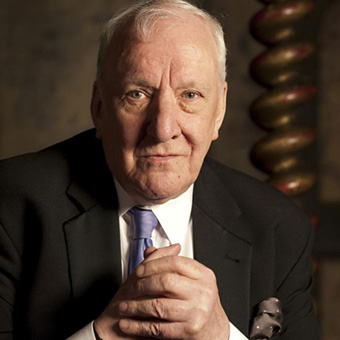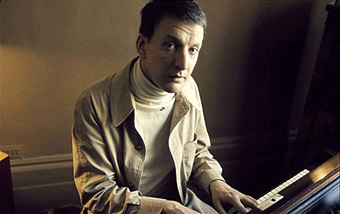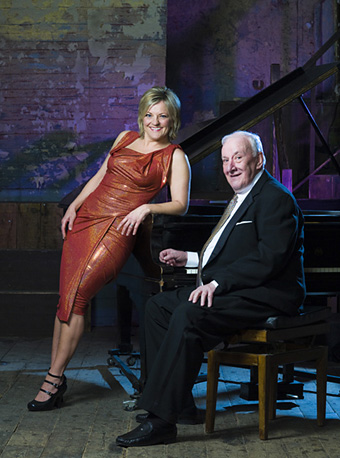

  |
|
|
||||||||||||||||||||||
|
FMS FEATURE... January 4, 2013 Sir Richard Rodney Bennett: An Appreciation Celebrated British composer, arranger, performer leaves historic legacy by Jon Burlingame  Photo: BBC Singers He was nominated for the Academy Award three times – for Far From the Madding Crowd (1967), Nicholas and Alexandra (1971) and Murder on the Orient Express (1974) – but his more recent excusions into film included the popular Enchanted April (1991) and Four Weddings and a Funeral (1994). He won a BAFTA for Orient Express and was nominated several more times for equally deserving scores including Equus (1977) and Yanks (1979). Bennett's television music was equally notable, including an Emmy nomination for Murder With Mirrors (1985) and several period pieces, among them Sherlock Holmes in New York (1976), Tender Is the Night (1985), and his final work in the medium, Gormenghast (2000). But Bennett was also one of England's finest composers of music for the concert hall. He wrote three symphonies, five operas, concertos for almost every instrument, and dozens of chamber and choral works – more than 200 in all. And, unlike most composers of orchestral music, he was also a beloved cabaret entertainer, often accompanying vocalists in renditions of Great American Songbook standards. "The sheer range of his work as a composer is extraordinary by any standards," says fellow composer (and former student) Christopher Gunning. "Add to that concert pianist, jazz pianist and singer, and you still don't quite have the measure of the man. His was a talent the like of which the world seldom sees." He was born March 29, 1936, in the English coastal town of Broadstairs, Kent. His mother studied music with Gustav Holst and he began playing piano, and composing, as a child. Informal studies with composer Elisabeth Lutyens, more formal studies at the Royal Academy of Music, and a two-year period studying in Paris with Pierre Boulez, resulted in an early fascination with serialism and the musical avant-garde that Bennett eventually abandoned in favor of more tonal works. Bennett started working in film in the late 1950s. Fellow composer John Scott recalls playing flute and saxophone on several of them, including the Joseph Losey film Blind Date (also known as Chance Meeting, 1959). "It was always a joy working for Richard," Scott recalls. "His music was always so well conceived, well written and beautifully orchestrated; Richard counted orchestration as part of composition." "Richard always had a deep love of jazz," Scott adds. "He appeared regularly in jazz clubs where he showed off his extreme dexterity and jazz invention playing the music he loved." Scott played flute in the 1964 premiere of Bennett's Jazz Calendar, which later became part of the Royal Ballet repertoire. Bennett scored Hammer films (The Man Who Could Cheat Death, The Nanny, The Witches) and even contributed music to Doctor Who during the early William Hartnell era. But it was his haunting score for Far From the Madding Crowd, John Schlesinger's film of the Thomas Hardy novel, that brought him fame in the film world.  Photo: Vincent McEvoy On a vastly different note, Bennett created an exciting score for the Michael Caine film Billion Dollar Brain (1967). It's one of the most stunning in the spy genre, in the words of commentator Care, "a glitzy, postmodern, eclectic and droll work that melds minimalism, modernism, neoclassicism and pop for an utterly unique take on 1960s spy moods." Its use of the electronic Ondes Martenot lends an especially exotic note. Gunning recalled working for Bennett on the epic Nicholas and Alexandra ("military band pieces and Viennese waltzes") as "the most fantastic experience... watching Richard and conductor Marcus Dods at work taught me a great deal." As fellow composer Irwin Bazelon later reflected: "The music's emotional, lyric sweep is eloquently expressive and heavily influenced by Russian music of the late 19th century." The result was a second Oscar nomination. For Lady Caroline Lamb (1972), a historical drama that starred Sarah Miles and was savaged by the critics, Bennett provided an exquisite score that he adapted into a two-movement piece for viola and orchestra for the soundtrack album. The 17-minute "Elegy for Caroline Lamb" stands as one of the finest concert works to emerge from a film score in the last 40 years. Bennett's most famous film music, though, is probably the all-star Agatha Christie mystery Murder on the Orient Express, an instance of a composer dissuading a director on his initial musical impulse and giving him, instead, a score that was far more suitable for its subject. Director Sidney Lumet had suggested an adaptation of 1930s tunes; Bennett countered that this was "a huge entertainment; I want to give the audience a feeling of glamor and excitement." One of Lumet's ideas that did work was the idea of replicating "1930s-style Carmen Cavallaro or Eddie Duchin, heavy on piano and strings," for a melodramatic opening. "He not only provided a piano score but also played it himself during the recording session," Lumet later recalled. "Richard's a wonderful pianist; he had that Cavallaro style down to perfection. And when I heard the first rehearsal and realized that the train's theme was in waltz tempo, I knew we were on our way to a perfect score." So Bennett came up with two main themes: A wonderful '30s homage that he played himself ("to recreate the dizzying world of the Warsaw Concerto and all those great movie piano concertos... a glamorous fantasy"). And for the elegance of the train itself, "a big, sweeping waltz... an element of mad glamor... with the idea of making the train dance." Critics appreciated it: "in the grand expansive symphonic style, splendidly descriptive," said the Los Angeles Times. Sadly, that was his third and final Oscar nomination, even though he continued to work in American and British films for the next 25 years. There was a melancholy score for Equus, a brilliantly scored work for 24 strings (violas, celli, basses) that he hoped would "conjure a sense of awe, wonder and worship around this portrait of obsessive belief." There was also music for another Schesinger film, Yanks, which the Los Angeles Times described as "heroic, militant, robustly romantic and on an expansive scale." Bennett worked in television, too, with equal facility. His most delightful work in American TV may be Sherlock Holmes in New York, a two-hour romp with Roger Moore as Conan Doyle's famous sleuth, Patrick Macnee as Dr. Watson, John Huston as Moriarty and Charlotte Rampling as Irene Adler. "It starts in a theater with a red curtain and the credit titles come up on the curtain, so I did a kind of really rather bad 19th-century light-opera overture," Bennett recalled, and it's a grand curtain-raiser, as effective as his nostalgic solo-violin piece for Irene. Bennett's friend Leonard Rosenman conducted. Bennett moved from London to New York City in 1979, which made him more available to American television producers. His sole Emmy nomination came for Murder With Mirrors, another Christie mystery, but this time with Helen Hayes as Miss Marple. Elmer Bernstein conducted his charming score, written for just 15 players (including Ondes Martenot). Later came Tender Is the Night, a seven-hour Showtime miniseries with Peter Strauss and Mary Steenburgen based on the F. Scott Fitzgerald novel; Poor Little Rich Girl: The Barbara Hutton Story (1987), a five-hour NBC biopic with Farrah Fawcett; a final reunion with Schlesinger on the non-musical Tale of Sweeney Todd (1997); and the four-hour BBC fantasy Gormenghast. Gormenghast producer Estelle Daniel later praised Bennett's score as "music of dreamlike quality which plumbed the undercurrents of the soul. Pure Richard Rodney Bennett, heir to the English symphonic tradition, drawing on harmonic changes from the Renaissance and turning them into music for the new Millenium." The score won an Ivor Novello Award as "best original music for a television or radio broadcast." The 1990s saw Bennett associated with popular romantic films including a warm and nostalgic tone (again featuring the Ondes Martenot) for Miranda Richardson in Enchanted April and a tender theme for the romantic side of Four Weddings and a Funeral starring Hugh Grant. Bennett was knighted in 1998 and continued to produce music for the concert hall for the next decade to come, notably "Reflections on a Sixteenth Century Tune" for string orchestra (1999), a nursery-rhyme song cycle titled "Songs Before Sleep" (2003) and "Reflections on a Scottish Folk Song" for cello and string orchestra (2004), a commission from Prince Charles in memory of his grandmother, the Queen Mother. <
He also continued to sing and play in New York with such notable cabaret performers as Mary Cleere Haran and Claire Martin, garnering consistent raves from The New York Times ("Sir Richard's supremely suave pianism... a sensitive, truly intimate collaborator... cabaret at its most exalted").
 Sir Richard Rodney Bennett with Claire Martin "We have been robbed of a great and noble talent," John Scott said this week. "He was this cauldron of creativity," added American conductor-pianist Scott Dunn, who studied with him. "He was one of the great musicians of our time." Added Downton Abbey composer John Lunn: "Recently, while working on the Downton Christmas special at the end of Season 3, I was discussing a scene with the executive producer. We needed something different, a new kind of excitement. Eventually he said, 'something a bit Richard Rodney Bennett!' I knew exactly what he meant. When your name becomes an adjective, you know you've achieved something." ©2013 Jon Burlingame |
Search
Past Features
Feature Archives
|